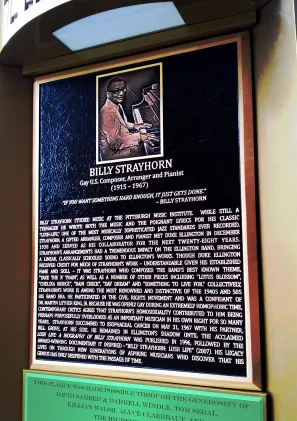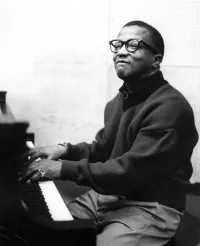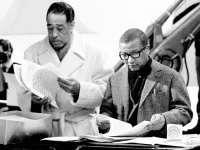Plaque Sponsor
Dave Samber and Darrell Windle, Tom Segal, Killian Walsh, Alyce Claerbaut, and the Highfield GroupBiography
1915 - 1967
“If you want something hard enough, it just gets done.”
- Billy Strayhorn
Billy Strayhorn studied music at the Pittsburgh Music Institute. While still a teenager he wrote both the music and the poignant lyrics for his classic “Lush-Life,” one of the most musically sophisticated Jazz standards ever recorded. Strayhorn, a gifted arranger, composer and pianist met Duke Ellington in December 1938 and served as his collaborator for the next twenty-eight years. Strayhorn's arrangements had a tremendous impact on the Ellington band, bringing a linear, classically schooled sound to Ellington’s works. Though Duke Ellington received credit for much of Strayhorn’s work – understandable given his established fame and skill – it was Strayhorn who composed the band's best known theme, "Take the ‘A’ Train", as well as a number of other pieces including "Lotus Blossom", "Chelsea Bridge", "Rain Check", "Day Dream" and "Something to Live For." Collectively, Strayhorn’s work is among the most renowned and distinctive of the 1940s and 50s Big Band Era. He participated in the Civil Rights Movement and was a confidant of Dr. Martin Luther King, Jr. Strayhorn was openly gay during an extremely homophobic time. Contemporary critics agree that his unapologetic openness about being gay contributed to him being perhaps purposefully overlooked as an important musician in his own right for so many years. He succumbed to esophageal cancer on May 31, 1967, with his partner, Bill Grove, at his side. He remained in Ellington’s shadow until his acclaimed biography, Lush Life: A Biography of Billy Strayhorn, was published in 1996, followed by the award-winning documentary it inspired – “Billy Strayhorn: Lush Life” (2007). His legacy lives on through new generations of aspiring musicians who discover that his genius has only deepened with the passage of time.
1915 - 1967
“If you want something hard enough, it just gets done.”
- Billy Strayhorn
Billy Strayhorn studied music at the Pittsburgh Music Institute. While still a teenager he wrote both the music and the poignant lyrics for his classic “Lush-Life,” one of the most musically sophisticated Jazz standards ever recorded. Strayhorn, a gifted arranger, composer and pianist met Duke Ellington in December 1938 and served as his collaborator for the next twenty-eight years. Strayhorn's arrangements had a tremendous impact on the Ellington band, bringing a linear, classically schooled sound to Ellington’s works. Though Duke Ellington received credit for much of Strayhorn’s work – understandable given his established fame and skill – it was Strayhorn who composed the band's best known theme, "Take the ‘A’ Train", as well as a number of other pieces including "Lotus Blossom", "Chelsea Bridge", "Rain Check", "Day Dream" and "Something to Live For." Collectively, Strayhorn’s work is among the most renowned and distinctive of the 1940s and 50s Big Band Era. He participated in the Civil Rights Movement and was a confidant of Dr. Martin Luther King, Jr. Strayhorn was openly gay during an extremely homophobic time. Contemporary critics agree that his unapologetic openness about being gay contributed to him being perhaps purposefully overlooked as an important musician in his own right for so many years. He succumbed to esophageal cancer on May 31, 1967, with his partner, Bill Grove, at his side. He remained in Ellington’s shadow until his acclaimed biography, Lush Life: A Biography of Billy Strayhorn, was published in 1996, followed by the award-winning documentary it inspired – “Billy Strayhorn: Lush Life” (2007). His legacy lives on through new generations of aspiring musicians who discover that his genius has only deepened with the passage of time.
Lesson Plan
Please login or register for an account to view this lesson plan.
Demography
Demography
Gender Male
Sexual Orientation Gay
Gender Identity Cisgender
Ethnicity African American Black
Nations Affiliated United States
Era/Epoch Civil Rights Movement (1954-1968)
Field(s) of Contribution
Advocacy & Activism
Art, Music, Literature & Theater
Music
Social Justice
Social Sciences
US History
Commemorations & Honors
Pittsburg's Regent Theatre Renamed the Kelly Strayhorn Theater in Honor of Strayhorn and fellow Pittsburgher Gene Kelly (2000)
Demography
Gender Male
Sexual Orientation Gay
Gender Identity Cisgender
Ethnicity African American Black
Nations Affiliated United States
Era/Epoch Civil Rights Movement (1954-1968)
Field(s) of Contribution
Advocacy & Activism
Art, Music, Literature & Theater
Music
Social Justice
Social Sciences
US History
Commemorations & Honors
Pittsburg's Regent Theatre Renamed the Kelly Strayhorn Theater in Honor of Strayhorn and fellow Pittsburgher Gene Kelly (2000)
Resources
Resources
Hajdu, David. Lush Life: A Biography of Billy Strayhorn. New York: Farrar Straus and Giroux, 1996.
http://www.pbs.org/independentlens/billystrayhorn/film.html
http://www.npr.org/2015/11/29/457598579/100-years-of-billy-strayhorn-emotional-architect-of-song
Resources
Hajdu, David. Lush Life: A Biography of Billy Strayhorn. New York: Farrar Straus and Giroux, 1996.
http://www.pbs.org/independentlens/billystrayhorn/film.html
http://www.npr.org/2015/11/29/457598579/100-years-of-billy-strayhorn-emotional-architect-of-song





